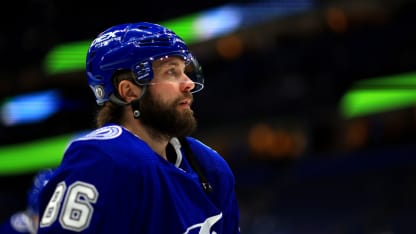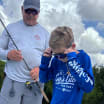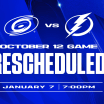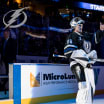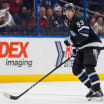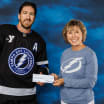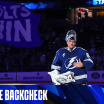But Kucherov was doggedly determined to return sooner than expected. There might not be a player in the National Hockey League that works harder on his game than the 27-year-old Russian. Kucherov approached his rehab with the same fervor he would in preparing himself in a typical offseason to get in playing shape for the season, or stay at his peak physical condition while in season. By March 13, Kucherov was skating on the ice with his teammates for the first time, still nowhere near ready to play in a game but an important first step to reach that goal.
And when the Lightning qualified for the playoffs for the seventh time in the last eight seasons and the 13th time total in franchise history by finishing third in the newly-configured Central Division, Kucherov was ready to return to the lineup. In the playoff opener against Florida, his first game in about seven-and-a-half months, Kucherov showed no signs of rust, scoring a pair of power-play goals and adding an assist to lead the Lightning to a come-from-behind 5-4 victory in Game 1.
He's continued to produce at the same level throughout this postseason, an incredible testament to the caliber of player he is and the work he did to get back.
It was a process to get there, however, almost as much mentally as it was physically.
On Friday, two days before the Lightning open their Stanley Cup Semifinals series against the New York Islanders, he opened up about the toll it took to get to this point.
"Missing the whole year, you ask any player, you don't want to be that guy," Kucherov said. "It's been tough just to watch the game from my house or from the stands. Going through the treatments and workouts and skating by myself, it's just mentally tough, but I had to go through it and I think I got better at it."
Kucherov was asked what rehab was like. His answer pulled back the curtain on the strain any injured player goes through to get back to playing the game they love.
"I had to go to the gym every day, and I hated it," he said. "I do the same stuff every day. It's really annoying. You get down on yourself sometimes. You want to go out there and play. Instead, you're going to the gym and doing this rehab stuff. It was tough. I got home from the game, guys are feeling good and I've got, tomorrow's the same thing. I don't get excited. I was trying to find a way to stay positive. Being with my family a little bit, seeing my son grow, that helped me a lot too to get away from the game a little bit and from thinking too much of it. It wasn't easy. But I think I got a lot stronger mentally and I understand what it takes to go through it."
There was one benefit from sitting out the season. Kucherov said he was able to see the game differently watching from afar rather than playing in it, a perspective he's been able to incorporate into his play now but one he never would have gained had he not been injured.
"Looking at the game from a different standpoint, power plays, how the team plays, how the team defends, how much time I would have if I was there, just stuff like that," he said.
